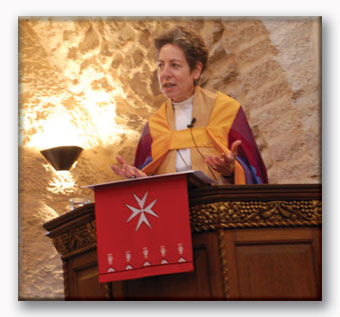Christians can manage to be the one church of Christ without agreeing on everything.
A church divided over the role of women, at war over the place of gays and lesbians, splitting between “prophetic” progressives and “tradition-minded” conservatives. Sound familiar?
The church in question is not the Roman Catholic Church but the Anglican Communion, the body of churches that recognize Canterbury as their spiritual center. Anglicanism suffered a blow in July when the Church of England voted to ordain women as bishops, though not until 2015. Debate over homosexuality and the 2006 election of the first female Anglican “primate,” Presiding Bishop Katharine Jefferts Schori of the U.S. Episcopal Church, already had some Anglicans speaking of a more conservative “alternative communion.” The July English vote only pushed them further on that course.
The Vatican was no more pleased, lamenting that “this decision will have consequences on the [Anglican-Roman Catholic] dialogue.” Ordaining women, the Vatican argued, perpetuates Christian division, which, according to the Second Vatican Council, “openly contradicts the will of Christ, scandalizes the world, and damages the sacred cause of preaching the gospel to every creature.”
Such is the sorry state of Christian unity. Once one hurdle is cleared, another, higher bar gets placed. Having resolved the question of justification by faith with the Lutherans and Methodists in 1998, and agreed on the fundamental nature of Baptism and Eucharist with a great many other Christian churches over the past four decades, we still seem no closer to full “visible” communion with anyone. Women’s ordination, the role of the pope, and human sexuality all seem capable of keeping the baptized divided well into the future.
At the same time there has been a kind of selective ecumenism, in which those who are dissatisfied with the liberal turn of their own churches “return” to Catholicism, albeit with special privileges. Immediately after the Anglican vote, Church of England Bishop Andrew Burnham of Ebbsfleet sought “magnanimous gestures from our Catholic friends, especially from the Holy Father,” according to the BBC, expressing his hope that entire parishes might “cross the Tiber,” while still maintaining the trappings of Anglicanism.
Such an option is not out of the question. In the United States there are six Catholic parishes made up of former Episcopalians who celebrate the traditional Anglican liturgy under the “Pastoral Provision” approved by Pope John Paul II in 1980 (pastoralprovision.org). Also under the provision, just under 100 former Episcopal priests are now ordained as Catholic priests. Just last year, Rome liberalized the use of the T ridentine Latin liturgies, primarily to lure back those who went into schism over the reforms of the Second Vatican Council.
These approaches are actually nothing new: One of the Orthodox beefs with the Vatican is that Rome has over the centuries entered into full communion with breakaway Orthodox churches who were willing to accept the pope while at the same time keeping their own liturgies and traditions.
It seems in the matter of unity, some things are important (recognizing the pope, not ordaining women), and some are not (priestly celibacy, liturgical uniformity). I actually don’t think such an approach to ecumenism is a bad one. Some things are more important than others. But that begs the question: Which are worth “scandalizing the world” over and “openly contradicting the will of Christ” about?
Surely we must—and generally do—have broad agreement about what is called “the deposit of faith”: the ancient creeds, the canon of scripture, the early church councils. But it’s unclear to me whether disagreements about the ministry of women or sexuality or the specific role of the pope should prevent “full communion” among Christians, or even literally sharing Communion. The Christian family can certainly work these questions out in charity given time.
More important is “preaching the gospel to every creature.” But as long as Christians remain divided, our “sacred cause” will remain unfulfilled.
















Add comment